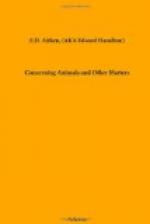The bird, occupied with thoughts of love and beauty, with “fields, or waves, or mountains” and “shapes of sky or plain,” has made little advance in the art and instruments of good living. It swallows its food whole, scarcely knowing the taste of it, and a pair of forceps for picking it up, tipped and cased with horn, is the whole of its dining furniture. For the bill of a bird, primarily and essentially, is that and nothing else. In the chickens and the sparrows that come to steal their food, and the robin that looks on, and all the little dicky-birds, you may see it in its simplicity. The size and shape may vary, as a Canadian axe differs from a Scotch axe; some are short and stout and have a sharp edge for shelling seeds; some are longer and fine-pointed, for picking worms and caterpillars out of their hiding-places; some a little hooked at their points, and one, that of the crossbill, with points crossed for picking the small seeds out of fir-cones; but all are practically the same tool. Yet the last distinctly points the way to those modifications by which the simple bill is gradually adapted to one special purpose or another, until it becomes a wonderful mechanism in which the original intention is quite out of sight.
At this point I find an instructive parable in my tool chest. Fully half of the tools are just knives. A chisel is a knife, a plane is a knife set in a block of wood, a saw is a knife with the edge notched. Moreover, there are many sorts of curious planes and saws, each intended for one distinct kind of fine work. All these the joiner has need of, but a schoolboy would rather have one good, strong pocket-knife than the whole boxful. For, just in proportion as each tool is perfected for its own special work, it becomes useless for any other. And your schoolboy is not a specialist. He wants a tool that will cut a stick, carve a boat, peel an apple, dig out a worm—in short, one that will do whatever his active mind wants done.
Now apply this parable to the birds. If you see a bill that is nothing but a large and powerful pair of forceps, good for any rough job, you may know without further inquiry that the owner is no limited specialist, but a “handy man,” bold, enterprising, resourceful, and good all round. He will not starve in the desert. No wholesome food comes amiss to him—grub, slug, or snail, fruit, eggs, a live mouse or a dead rat, and he can deal with them all. Such are the magpie, the crow, the jackdaw, and all of that ilk; and these are the birds that are found in all countries and climates, and prosper wherever they go.
[Illustration: NO DOUBT EACH BIRD SWEARS BY ITS OWN PATTERN.]




